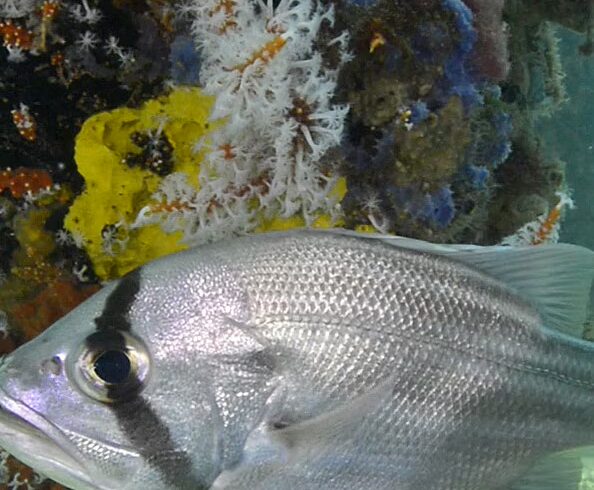
A temporary ban on fishing iconic species, including WA dhufish and pink snapper, could be on the table as the state government scrambles for solutions to WA’s at-risk fish populations.
The spawning biomass of WA’s iconic dhufish has been recorded at levels as low as seven per cent off Perth’s coast, according to the Department of Fisheries.
Spawning biomass refers to the amount of mature fish capable of reproduction — a biomass below 20 per cent means a fish population is considered at severe risk of collapse.
WA dhufish has consistently had a biomass around or below 15 per cent since the late 2000s, and is just one of several prized fish species at high-to-severe risk, according to the department’s latest assessment of WA’s fish stocks.
A pink snapper in waters off Western Australia’s coast. (Supplied: OzFish)
Pink snapper populations are at severe risk along the west coast, from Kalbarri to Augusta, while red emperor populations are also at severe risk along the Pilbara and Kimberley coasts.
‘Diabolical situation’
Industry, recreational fishers, and other stakeholders have gathered at a forum to discuss potential solutions to recover the state’s fish stocks.
Both peak bodies representing commercial and recreational fishers issued a statement in September, when the forum was announced, indicating a joint effort to tackling the issue of sustainable fishing.
Speaking at the forum on Monday morning, Recfishwest CEO Andrew Rowland voiced a need for a holistic approach.
But WA Fishing Industry Council CEO Melissa Haslam, representing the commercial sector, spoke with a much more combative tone.
Melissa Haslam says it’s a “diabolical situation”.
(ABC News: Andrew Chounding)
“What a diabolical situation we find ourselves in, and it’s a situation made worse by the fact that we have known that this day was coming for decades,” Ms Haslam said.
Ms Haslam gave a scathing assessment about recreational fishers not being required to report their catches, which she said made it difficult to assess their impact on fish stock.
“They [government] came to us at the beginning of this year and said ‘you guys, you’re going to be over your benchmark’ … the commercial sector copped another 40 per cent cut,” she said.
“If we’re all over benchmark … what’s going to happen to the other sectors? The answer was nothing, because we don’t know what they’re catching.
“Evidently you can’t manage this fishery by managing the commercial sector alone.”
Fisheries Minister Jackie Jarvis said “all management options need to be on the table” to address WA’s at-risk fish populations.
Jackie Jarvis says mandatory reporting of catches won’t be introduced for recreational fishers. (ABC News: Keane Bourke)
But when asked on Monday morning if mandated reporting could potentially be introduced for recreational fishers, Ms Jarvis said “that’s already been ruled out”.
Recfishwest has been contacted for further comment.
Heavy restrictions mooted
One of the strictest restrictions up for discussion is a complete ban on catching demersal fish for a temporary period.
Department of Primary Industries and Regional Development’s Nathan Harrison told the forum it was a possible strategy to be implemented in severe risk zones.
Stricter fishing rules flagged in WA
Under DPIRD’s “harvest strategy guidance”, catch reductions of 50 to 100 per cent were recommended for areas at severe risk, namely the Pilbara and West Coast regions.
“When we’ve had this approach before in the past, it’s been really trying to work towards that 50 per cent reduction. There hasn’t been an appetite to really go harder and actually deliver those significant reductions,” Mr Harrison said.
But he pointed to policies in the United States which had a much stricter approach.
“Their approach in the US, once you get 20 per cent, that is it, you shut the fishery,” Mr Harrison said.
“There’s no argument about it.”
Extinction warning
WA Greens MLC Sophie McNeill said data revealed by the department at the forum was shocking.
“The department is recording only seven per cent biomass for dhufish in the Perth metro area. It’s very clear that management practices over the last 20 years have failed,” she said.
Ms McNeill said temporary fishery closures would only result in people “fishing harder when the closures are lifted”.
“If we don’t take immediate steps to better protect our demersal fish and reduce catches, a species like dhufish could become functionally extinct in our lifetime,” she said.
Sophie McNeill says species like dhufish could become extinct. (Supplied: WA DPIRD)
WA Nationals fisheries spokesperson Kirrilee Warr said she would organise a petition this week pushing the state government to do more.
“We’re hearing today already that people are saying its not fishing alone, there are other impacts that are coming into these fish stocks,” she said.
“That could be coming from climate, it could be coming from developments within the marine estate.”
The state government has indicated potential restrictions would be put in place by the end of the year.
Loading
Source





